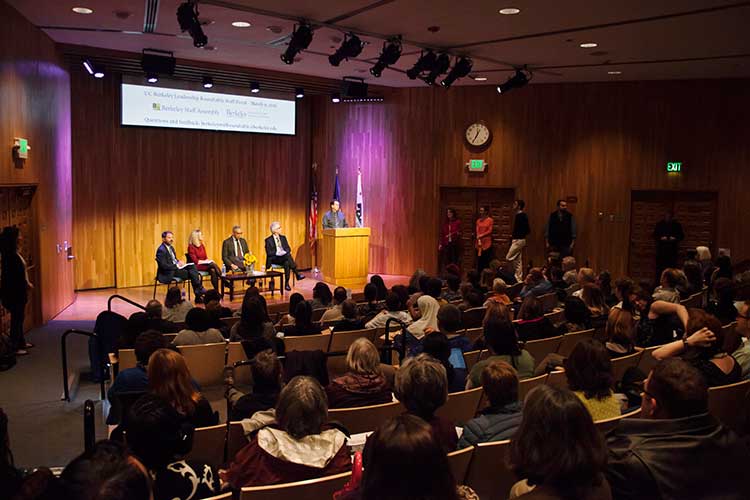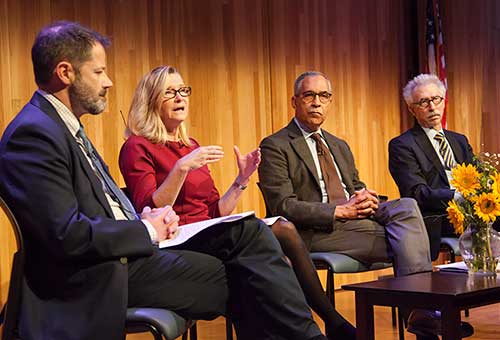Berkeley’s budget challenge: reduce, rethink, restructure

March 11, 2016
Soon after Chancellor Nicholas Dirks arrived on campus in 2013, he posed for a photo in which he held aloft a bright blue UC Berkeley umbrella.
The image, he explained Wednesday to a packed auditorium filled mostly with campus staff, “was supposed to signify that we’d weathered the storm” of financial challenges that have buffeted Berkeley since long before his arrival.
Then, after a beat, he added: “It’s raining again.”
Dirks, of course, had already reported the inclement-budget news in a memo to the campus in early February. “For a variety of reasons, both internal and external,” the chancellor wrote then, “we face a substantial and growing structural deficit, one that we cannot long sustain. “

From left: Andrew Szeri, vice provost for strategic academic and facilities planning; Rosemarie Rae, chief financial officer; Claude Steele, executive vice chancellor and provost; and Chancellor Nicholas Dirks. (UC Berkeley photo by Brittany Murphy)
Dirks took the stage this week in Sibley Auditorium to flesh out that news, and to take questions during a 90-minute roundtable co-sponsored by the Berkeley Staff Assembly and the Chancellor’s Staff Advisory Committee. He was joined by Claude Steele, Berkeley’s executive vice chancellor and provost, Rosemarie Rae, its chief financial officer, and Andrew Szeri, vice provost for strategic academic and facilities planning.
Their message was that the campus faces a deficit in the neighborhood of $150 million for this fiscal year and has embarked on what Steele termed “a broadly consultative process” to review all areas of the campus for potential changes that would better position Berkeley for the future. The goal, they said, is smoothing out a recurring pattern of expansion and contraction — and maintaining Berkeley’s place as the nation’s top public university.
Both Steele and Dirks emphasized that the campus is entering this work from a position of strength and they are committed to looking across the entire organization carefully and strategically.
Instead of across-the-board cuts, Steele said, the focus would be on four general areas: academic restructuring, administrative realignment, fundraising and athletics. “We need to be strategic,” he said, calling this “a defining principle” for the changes in store.
“I want to stress that we are in the very early stages of this work,” he said, adding later that “we have money in the bank,” so that “we don’t have to do things instantly.”
That said, Wednesday’s session made clear that tough measures do lie ahead. For example, academic realignment – examining the organization of Berkeley’s schools and colleges — “has never been on the table before,” said Dirks, noting that the process will be “challenging” for faculty but that it will include extensive consultation and that no decisions have been made yet .
Steele, responding to recent news reports about the College of Chemistry, suggested that the administrative structure of the college as a free-standing entity was being examined but firmly rejected rumors that the discipline of chemistry was being eliminated. The College of Chemistry, Steele said, is comprised of two top-ranked departments; under consideration is whether administratively these could be shifted to other parts of the campus — specifically, the College of Letters and Science or the College of Engineering — in order to foster increased academic collaboration. He insisted “we would never do anything to undermine” the departments’ reputations, or the quality of the teaching and research for which they’re known“ and that any decision in this area will involve an extensive consultative process.
As for recent news reports about the School of Public Health, Steele said there has been no decision to dismantle the undergraduate major in public health and that any actions in that area were the result of “well-intended” decisions at the school. “The rumor got out ahead of the facts,” he said. “That decision, if it is made” — as with the the College of Chemistry — “is a long way down the road.”
In the short term, said Rae, “what we’re asking units to do is to look for cost savings within their particular units. And with salaries and benefits making up almost 67 percent of our budget, it is inevitable that we will have to look there.” She also said that units were being asked to produce balanced in-year budgets.
As for the possibility of new retirement incentives to winnow the workforce, she said, “I’m not anticipating that.”
She added that staff will play a key role in providing input and expertise into the campus’s planning process through a “staff engagement group” made up of representatives of the Berkeley Staff Assembly) and the Chancellor’s Staff Advisory Committee.
As Rae’s co-lead in the planning effort, Szeri reiterated the importance of staff engagement, adding that the campus’s Operational Excellence effort made major inroads in modernizing Berkeley’s creaky administrative systems, but admitted it “didn’t have a very good staff engagement mechanism.”
That, the foursome agreed, is a mistake the campus will not make again.
“We’re not going to make changes for change’s sake,” promised the chancellor. “And we are going to make decisions that, in part, are about saying that as an institution we can’t do everything we’ve been doing.”
The campus faces “a time of uncertainty,” Dirks said. “But we won’t do anything without extensive consultation.”
You can view of a video of the roundtable here.